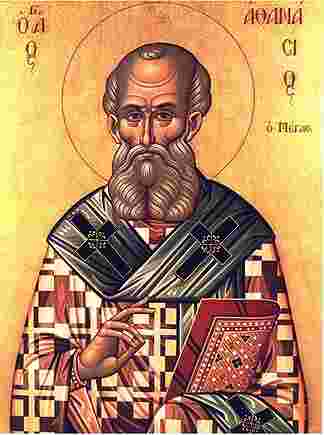
My wife dragged me off tonight, with friends, to see Hugh Jackman in The Greatest Showman. I confess that I wasn’t overly thrilled. I have to be in the right mood for musicals, I’m not much into dance, and I had skimmed a couple of negative reviews.
I was surprised to like it as much as I did. The negative reviews weren’t altogether wrong, and I still don’t get all that thrilled about dancing. But Hugh Jackman is enormously talented and the choreography — even for somebody like me — was stunning.
***
And now, on to more significant matters, via two quotations from the treatise On the Incarnation (De Incarnatione), by St. Athanasius of Alexandria (ca. AD 296-373:
“The Lord did not come to make a display. He came to heal and to teach suffering men. For one who wanted to make a display the thing would have been just to appear and dazzle the beholders. But for Him Who came to heal and to teach the way was not merely to dwell here, but to put Himself at the disposal of those who needed Him, and to be manifested according as they could bear it, not vitiating the value of the Divine appearing by exceeding their capacity to receive it.”
“You know how it is when some great king enters a large city and dwells in one of its houses; because of his dwelling in that single house, the whole city is honored, and enemies and robbers cease to molest it. Even so is it with the King of all; He has come into our country and dwelt in one body amidst the many, and in consequence the designs of the enemy against mankind have been foiled and the corruption of death, which formerly held them in its power, has simply ceased to be. For the human race would have perished utterly had not the Lord and Savior of all, the Son of God, come among us to put an end to death.”
***
A very, very old Arabic Christmas carol:
http://www.patheos.com/blogs/joeljmiller/2012/12/christmas-carol-you-may-have-never-heard/
If you’re a westerner, its melody will probably strike you as . . . odd.
Which reminds me of a story that doesn’t, perhaps, portray me at my absolute best.
Decades ago, when my wife and I were living in Cairo, a couple in the branch invited us along — shortly before Christmas — on a long drive toward Alexandria and out across the coastal desert toward the border of Libya. They were nice people, working for an oil company. But not especially cosmopolitan or cultured. And she really, really, really disliked Egypt.
She began complaining about Arabic music, which she found intolerable. (Except where it’s been influenced by western pop music, it represents a distinctly different tradition, with little or no harmony but also with rhythms and melodies often far more complex than ours.) I listened to her on the subject for some time, with mounting impatience
Finally, I remarked rather innocently that, when the angelic choir sang to the shepherds of Bethlehem, they probably sang in a musical style or idiom that was comprehensible to those first-century Palestinian shepherds. Which, I continued, strongly suggests that it likely sounded more like traditional Middle Eastern music than like Händel or Bach or Bing Crosby.
She was speechless. Then she said “Oh. Oh my. Oh. That’s a horrible thought.”
I confess that I glowed inwardly for the next several (silent) minutes.










